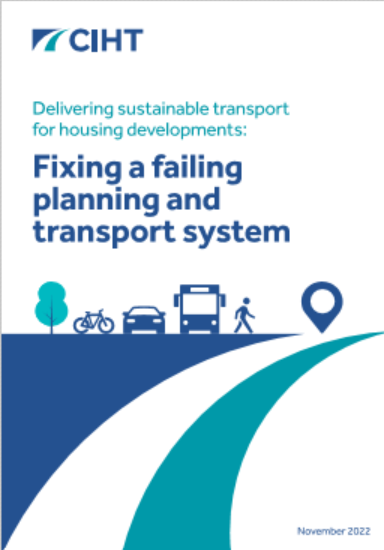

CIHT outlines how the UK can deliver sustainable transport for housing developments.
>>> Access the whitepaper here
Join other savvy professionals just like you at CIHT. We are committed to fulfilling your professional development needs throughout your career
The need to improve the integration of planning and transport is certainly not a new issue, but numerous attempts to encourage their incorporation have seen limited progress
The UK needs developments that embed sustainable transport from the outset, not for it to be an afterthought. As this paper will show, planning and transport policy is not delivering the sustainable developments needed, something that we can ill afford if the UK really wants to take action on the climate crisis. Therefore, the UK Government, CIHT, and other professional institutions have a duty to support our members and, in collaboration with our partners, we believe we can deliver real and long-lasting change across our sector and society.
In this publication, sustainable development refers to those developments that prioritise sustainable transport modes such as walking, wheeling, cycling, and public transport.
The principles included in this publication are relevant across the UK, including devolved nations, but the specific policy framework discussed here applies to England only.
Sue Percy CBE, Chief Executive, CIHT said:
Housing developments are still dominated by cars, with little sustainable transport provision. Not only does this have serious effects for the health of our planet, but it also severely impacts the health of our people.
The integration of planning and transport is key to helping achieve healthier, more sustainable development that promotes economic growth, levels up the country, and provides for people, not cars
This is currently not being achieved. To gain a better insight, this new research paper details five key areas for action informed by the views of practitioners from the Chartered Institution of Highways and Transportation (CIHT), Royal Town Planning Institute (RTPI), and Transport Planning Society (TPS) – 87% of which agreed that “there are problems with the current planning system with regard to delivering sustainable development and securing more sustainable transport use.
This paper is the result of very close collaboration between CIHT, TPS, and RTPI, and is founded on an in-depth survey of the membership of all three bodies, all of whom are deeply involved in the planning and delivery of sustainable transport for housing developments.
87% of which agreed that “there are problems with the current planning system with regard to delivering sustainable development and securing more sustainable transport use.
The urgent “Call for Action” merits serious attention given the five barriers to success identified and elaborated by the 700+ professionals contributing to the findings.
The report outlines five calls to action for the UK Government, local authorities, developers, and stakeholders:
Through combining anticipated policies on economic growth, net zero, and levelling up with the five actions proposed here, CIHT believes this will bring about positive change for sustainable development. Ultimately, this will reduce the traffic-inducing nature of developments, and the associated costs of the infrastructure to deliver these, making it quicker and easier to deliver new housing. By making sustainable transport a natural first choice in developments we will get more people active, improve health outcomes, and reduce pressure (and therefore expenditure) on the NHS.
>>> Access the whitepaper here
The Chartered Institution of Highways & Transportation (CIHT) would like to acknowledge that the contents of the report are the collaborative efforts of those that extend beyond the authors listed. As such, we would like to thank all CIHT, Royal Town Planning Institute (RTPI) and Transport Planning Society (TPS) members as well as staff who contributed.
If you have any questions or wish to discuss any of its content, please contact e: technical@ciht.org.uk
Journalists with enquiries can contact the CIHT Communications Team by E: communications@ciht.org.uk or +44 (0)20 7336 1555 (Option 4)
Join other savvy professionals just like you at CIHT. We are committed to fulfilling your professional development needs throughout your career
